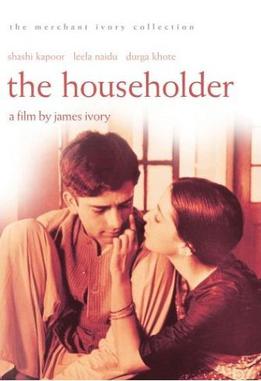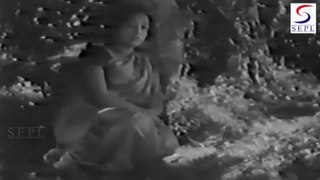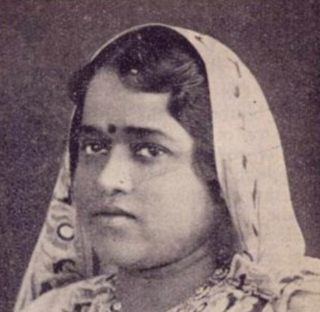Related Research Articles

Meera, better known as Mirabai, and venerated as Sant Meerabai, was a 16th-century Hindu mystic poet and devotee of Krishna. She is a celebrated Bhakti saint, particularly in the North Indian Hindu tradition. She is mentioned in Bhaktamal, confirming that she was widely known and a cherished figure in the Bhakti movement by about 1600. In her poems, she had madhurya bhava towards Krishna.

New Theatres is an Indian film studio. It was formed in Calcutta by producer B. N. Sircar. It was formed on February 10th, 1931. The company motto was "Jivatang Jyotiretu Chhayam," meaning, "Light infusing shadows with life." Sircar preferred to function roughly analogous to an executive producer. He built a processing laboratory, and acquired staff. Once a film subject was selected and a team assembled to create the picture, Sicar ensured that adequate funds were provided, while refraining from interfering with its execution. He made New Theatres a symbol of Bengali cinema's artistic good taste and technical excellence.

The Householder is a 1963 film by Merchant Ivory Productions, with direction by James Ivory and a screenplay by Ruth Prawer Jhabvala and James Ivory, and direction of James Ivory. It is based upon the 1960 novel of the same name by Jhabvala.
Bhojraj Singh Sisodia was the eldest son of Rana Sanga, ruler of Mewar in western India. He is best known as the husband of the reputed bhakti poet-saint Meerabai.

Debaki Bose (1898–1971), also known as Debaki Kumar Bose, was an Indian director, writer, and actor who is recognized for his contribution in Hindi as well as Bengali cinema. He was born on 25 November 1898 in Akalposh,, Burdwan, Bengal Presidency, British India. He died on 17 November 1971 in Calcutta, West Bengal, India. He is known for his innovative use of sound and music in Indian Cinema. He worked first under the banner of British Dominion Films of Dhiren Ganguly and later with Pramathesh Barua's Barua Pictures and finally he joined New Theatres banner in 1932. He started his own production company, Debaki Productions, in 1945.

Nitin Bose was an Indian film director, cinematographer and screenwriter of the nation's film industry. He was born in Calcutta and died in the same city. In the 1930s and early 40s, he worked with New Theatres, who made bilingual movies: in both Bengali and Hindi. Later, he moved to Bombay and directed under the banners of Bombay Talkies and Filmistan.
Dhoop Chhaon or Bhagya Chakra is a 1935 Hindi movie directed by Nitin Bose. It was a remake of the Bengali film Bhagya Chakra. Dhoop Chhaon was the first Hindi film to use playback singing. It was Bose who came up with the idea of playback singing. He discussed with music director Raichand Boral and Bose's brother Mukul Bose, who was the sound recordist in New Theatres, and who implemented the idea.

Vidyapati is a 1937 Bengali biopic film directed by Debaki Bose for New Theatres. It starred Pahari Sanyal as Vidyapati. His costars in the film were Kanan Devi, Prithviraj Kapoor, Chhaya Devi, Leela Desai, K. C. Dey and Kidar Sharma. The music was by R. C. Boral and lyrics by Kidar Sharma. Debaki Bose and Qazi Nazrul Islam wrote the story, screenplay and dialogues. The story is about the Maithili poet and Vaishnava saint Vidyapati. The songs of the film became popular and the lyrics though encapsulating Vidyapati's poetry were considered bold for its time. This however ensured the film garnered crowds at the theatres making it a big success of 1937.
Manzil is a 1936 Hindi film from New Theatres. A bilingual made in Hindi and Bengali (Grihadah), it was directed by P.C. Barua from a story by Saratchandra Chattopadhyay. The dialogues and lyrics were by Arzu Lucknowi and music composed by R. C. Boral and Pankaj Mullick. The cast included Prithviraj Kapoor, Jamuna, Pahari Sanyal, Molina Devi, K. C. Dey and Boken Chatto. The story, a love triangle, revolves around two friends Mahim and Suresh and the girl they both love, Achala.

Chandidas is a 1934 Hindi social drama film directed by Nitin Bose. The film was produced by New Theatres Calcutta and was their first big success. It was remake of the 1932 Bengali film of the same name directed by Debaki Bose. This 1934 Hindi version starred K. L. Saigal, Uma Sashi, Pahari Sanyal, Nawab and H. Siddiqui. The music direction was by R. C. Boral with the lyrics written by Agha Hashar Kashmiri. The credit roll of the film states that the film is "Based on the life problems of the poet Chandidas –A problem India has not been able to solve", which involved the caste schism in India. The story revolves around the 15th century poet-saint Chandidas who acts out against the deep-rooted bigotry against caste, untouchoubility and the hypocrisy of society, and a washer woman with whom he falls in love.
Yahudi Ki Ladki is a 1933 Urdu/Hindi costume drama film directed by Premankur Atorthy. Produced by New Theatres Ltd.Calcutta, the cast included K. L. Saigal, Rattan Bai, Pahari Sanyal, Gul Hamid, Nawab and Kumar. The film was adapted from Agha Hashar Kashmiri’s play of the same name Yahudi Ki Ladki which had been written in Bengali as Misar Kumari. He also wrote the screenplay and lyrics. The film saw Pankaj Mullick's debut as a Hindi music director. The dialogues were by Wajahat Mirza. The story revolves around the rivalry and revenge between the Jewish merchant Prince Ezra and the Roman priest Brutus.

Karwan-E-Hayat is a 1935 Urdu/Hindi costume action-adventure film. The film is directed by Premankur Atorthy, with assistance by Hemchandra, for New Theatres Ltd. Calcutta; and it was produced by Lahore branch of New Theatres. The cast included K. L. Saigal, Rattan Bai, Pahari Sanyal, Rajkumari, Shyama Zutshi, Gul Hamid, Rajkumari, Molina, Shyama Zutshi, Siddiqi, Kapoor and Rana. The cinematographer was Krishna Gopal, with music composed by Mihir Kiran Bhattacharya and his brother Timir Baran Bhattacharya, with lyrics by Hakim Ahmad Shuja Pasha. The film, a costume drama, involved the Prince Pervez on the run from an arranged marriage to a princess, only to fall in love with her when they meet in unusual circumstances.
Dulari Bibi is a 1933 Hindi/Urdu comedy film. It was directed by Debaki Bose and produced by New Theatres Ltd. Calcutta. A short 3 reel film it centred on the story of Our Wives. The film starred K. L. Saigal, Molina Devi, Mir Jan and the music was composed by R. C. Boral. It was listening to K. L. Saigal in this film that Pahari Sanyal realised the uniqueness of Saigal's voice as heard through the microphone. He found it more effective, "sweeter", as compared to him singing live.

Daku Mansoor also called Karishma-E-Kudrat is a 1934 Hindi/Urdu costume action drama film directed by Nitin Bose. The film was produced by New Theatres Ltd. Calcutta and the music director was R. C. Boral. The cast of the film included K. L. Saigal, Uma Shashi, Prithviraj Kapoor, Husnbanu, Pahari Sanyal and Nemo. Daku Mansoor was actress Husn Banu’s debut film.
Karodpati is a Hindi 1936 comedy film directed by Hemchander Chunder. The film was produced by New Theatres Ltd. Calcutta, and the music was composed by R. C. Boral with the assistance of Pankaj Mullick. The lyrics were written by Kidar Sharma who also acted in the film. The film starred K. L. Saigal, Sardar Akhtar, Molina Devi, Pahari Sanyal, Nawab, Trilok Kapoor, Rajkumari, and Kidar Sharma. The film showcased K. L. Saigal performing a farcical-comedy role which was a different format from his normal tragedy based stories. The story revolves around a cinema-crazy young man who wins a lottery, leading to a series of comedic situations when his friends join him.
Mohabbat Ki Kasauti also called Rooplekha in Bengali was a 1934 Indian "semi-historical" bilingual film in Hindi and Bengali, directed by P. C. Barua for New Theatres. Though Barua is consistently mentioned as the director, according to author J. K. Bajaj, Debaki Bose directed Rooplekha in 1934. It had music by R. C. Boral and the cast included Rattanbai, K. L. Saigal, Pahari Sanyal, Noor Mohammed Charlie and Vishwanath. Jamuna started her career with a small role in the Hindi version.

Trilok Kapoor was an Indian actor and a member of the Kapoor family who worked in Bollywood films. He was the younger brother of actor Prithviraj Kapoor.

Adhuri Kahani is an Indian film directed by Chaturbuj Doshi released in 1939. The cast includes Durga Khote, Prithviraj Kapoor, Rose, Keshavrao Date, Ila Devi, Ishwarlal, Meerabai, Yakub, Khatoon, Mirza Musharraf, T. Zaidi. The film also had Meena Kumari as a child artist, Kumari was not rechristened as a baby meena then.

Indubala, sometimes credited as Miss Indubala, Indubālā Debī, or Indubala Devi, was a Bengali singer and actress. She received the Sangeet Natak Akademi Award in 1975.
Husn Banu was a Bollywood actress famous as a stunt actress after "Hanterwali Nadia", and later worked as a supporting actress in films from the 1930s to the 1970s. She was born in 1919 in Singapore.
References
- ↑ Gulzar, Nihalini, Chatterjee, Govind, Saibal (2003). Encyclopaedia of Hindi Cinema. India: Popular Prakashan. ISBN 9788179910665 . Retrieved 1 September 2014.
{{cite book}}: CS1 maint: multiple names: authors list (link) - ↑ Rajadhyaksha, Willemen, Ashish, Paul (2014). Encyclopedia of Indian Cinema (2, revised ed.). Routledge. ISBN 9781135943257.
{{cite book}}: CS1 maint: multiple names: authors list (link) - 1 2 Pauwels, Heidi R.M. (2003). Indian Literature and Popular Cinema: Recasting Classics. Routledge. p. 101. ISBN 9781134062546 . Retrieved 1 September 2014.
- ↑ "Rajrani Meera 1933". citwf.com. Alan Goble. Retrieved 1 September 2014.
- ↑ Ranade, Ashok Damodar (2006). Hindi Film Song: Music Beyond Boundaries. Bibliophile South Asia. ISBN 9788185002644 . Retrieved 1 September 2014.
- ↑ Nevile, Pran (2011). K. L. Saigal A Definitive Biography. India: Penguin Books India Pvt. Ltd. p. 13. ISBN 9780143414063.
- ↑ Raj, Ashok (2009). Hero Vol.1, Volume 1 Bollywood series. Hay House, Inc. ISBN 9789381398029 . Retrieved 1 September 2014.
- ↑ Kapoor, Gehlot, Shashi, Deepa (2004). Shashi Kapoor Presents the Prithviwallahs. India: Roli Books. ISBN 9788174363480.
{{cite book}}: CS1 maint: multiple names: authors list (link) - ↑ Aravamudan, Srinivas (27 June 2011). "5". Guru English: South Asian Religion in a Cosmopolitan Language. Princeton University Press. pp. 212–. ISBN 978-1-4008-2685-8 . Retrieved 1 September 2014.
- ↑ Bhatnagar, Dube, Rashmi Dube , Reena (2012). Female Infanticide in India: A Feminist Cultural History. SUNY Press. ISBN 9780791483855 . Retrieved 1 September 2014.
{{cite book}}: CS1 maint: multiple names: authors list (link)